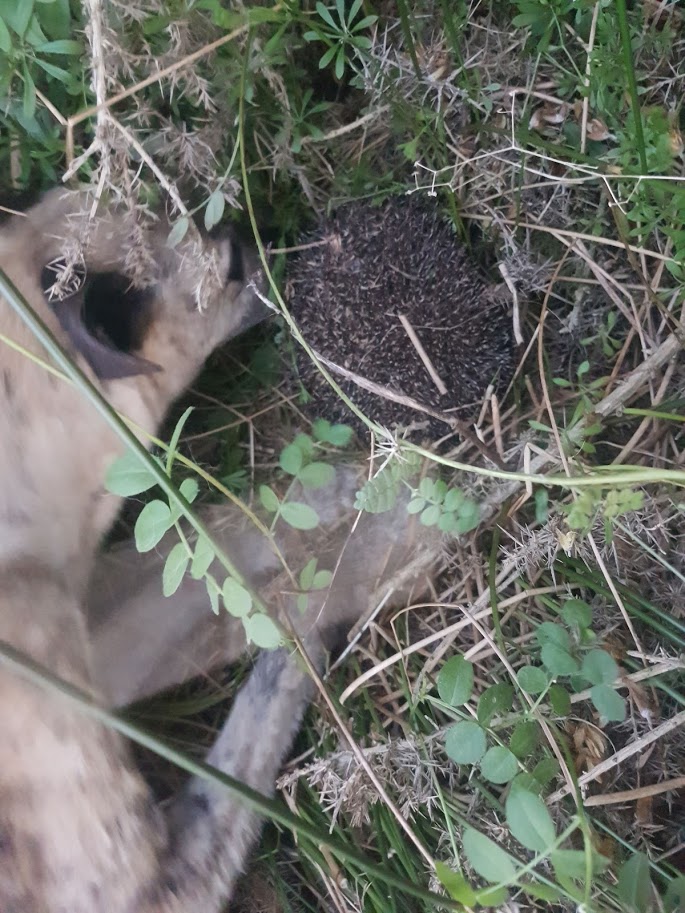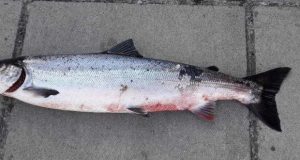Irish Extra – July 2020

I was exercising my Teckels and Lurchers on a Tuesday evening a couple of weeks back, we were on the same route we usually take each evening and it consists of the field out the back, through a gate, down a rough track and along the river through a field we call Buzzi’s. There is never usually much excitement but over the last few weeks we had on a couple of occasions saw a fox, one particular evening the Teckels hunted him after springing him from some Japanese knotweed for over 30 minutes before loosing him and on another dark night I caught him in the back field with the lamp. I knew it was the same fox each time as he was quite mangy looking and had little or no hair on its tail and my neighbour across the river is constantly pestered by foxes and had her poultry raided several weeks in a row. As we approached the top of the track on our return, I heard my young Teckel bitch “Poppy” yipping, followed by the other bitch “Cider” who only speaks when there is something there and also “Oscar” was now opening up as well which is a sure sign of something afoot. “Reggie” my Lurcher dog took off with the whippet behind him and my old bitch “Fudge” now 10 years old was with me as she had her head deep in the gorse investigating something which turned out to be a hedgehog. Within a few minutes “Reggie” returned with the whippet, both but particularly “Reggie” stank of Fox, and they lolloped around excitedly and we walked back the way the had just come. I walked through a clearing on the gorse and followed “Reggie” and the whippet and as I did, I met the Teckels and a fox expired at the bottom of a small hill. “Reggie” had obviously been in the right place at the right time after the Teckels had spring him from the cover. On close inspection I would be sure it was the same fox we had met over the last few days as this dog was in poor condition with a hairless tail and no bottom canines, as well as a battle scared nose which had grew back out of shape over time. “Reggie” has not unfortunately developed the traits of his mother or grandmother who would have carried anything they caught back to me including foxes.
My work has been busy as always and most recently I have been trapping squirrels as part of a conservation project, a pleasant and welcome change from rabbits which have been literally non stop all spring. David and I have been very busy on one particular job and while it was initially difficult and seemed almost beyond control we have finally turned a corner and are now into the “single figure” stage which is the most important as it is not what you remove but what you leave behind.

Donegal Harriers Hunt Ball Benefits local charities
Mevagh fire service & Mulroy coastguard were two of this years deserving recipients of a €500 donation from the proceeds of the Donegal Harriers recent charity hunt ball.
Sea Anglers can you help?
Inland Fisheries Ireland is looking to gather information from all Irish sea anglers through an online survey as part of a new programme – the Irish Marine Recreational Sea Angling Survey (IMREC) . The findings of the survey will help inform the larger project with the overall aim being to improve the management of stocks and support conservation efforts thereby contributing to increasing the availability of fish to sea anglers in the future. For more information about IMREC, visit https://www.fisheriesireland.ie/Projects/imrec.html where you can learn more, including a full FAQ guide.
This online survey seeks to collect information on the behaviours, attitudes and catch preferences of all Irish sea anglers. This information will feed into the IMREC project where it will be analysed by researchers. Inland Fisheries Ireland has established this new programme which will give a clear picture of how fishing activities relate to stock levels. This work is funded by the European Maritime and Fisheries Fund (EMFF).
Dr Cathal Gallagher, Head of Research and Development at Inland Fisheries Ireland said: “We know that there are approximately 126,000 sea anglers in Ireland and we hope that they will help us to find out how often people go fishing, what they catch and what they release. Sea angling is an important activity here in Ireland and we want to ensure the future of marine fisheries resource.
The data collected will help us to make informed decisions on how to best estimate sea angling catches in Ireland. This catch data will inform management decisions and will prevent the use of worst case scenarios, which can happen when there is a degree of uncertainty surrounding information.”
The survey will take approximately 10-20 minutes to complete and participants will receive an Angling Ireland neck buff and line clipper for taking part. Participants will also have a chance of winning one of three sets of tackle vouchers for a fishing shop of your choice (1st prize €200, 2nd prize €150, 3rd prize €100). You can participate in the survey by visiting the following link: https://www.surveymonkey.com/r/IMRECSurvey.
Red Skin Disease

For the second year in succession, Inland Fisheries Ireland (IFI) has received reports of a small number of fresh-run wild salmon displaying signs of red skin disease (RSD) returning to Irish rivers.
The two rivers in question so far this year are the river Leannan, Co Donegal, and river Corrib, Co Galway.
Incidences of the disease were first documented last year in 56 salmon from 17 rivers throughout the country. The majority of the reports occurred in June and July with only one incidence reported prior to and after this time.
In the past few weeks, suspected cases have also been reported in Denmark, Norway and Scotland.
Salmon affected have a characteristic red-spotted rash on their underbelly and may appear lethargic or moribund. The rash can either be localised or extend along some or most of the fish.
As the disease progresses, skin lesions, signs of bleeding and skins ulcers can develop primarily along the belly area and extend to the head and tail. Secondary fungal infection can further develop, which may ultimately result in death of the salmon.
Fisheries staff are liaising with the Marine Institute Fish Health Unit and international colleagues to monitor and respond to the situation. As part of this, anglers and fishery owners are asked to report any incidences of RSD to help determine the occurrence of the disease.
Anglers who capture such salmon are advised to follow normal biosecurity procedures and disinfect tackle, waders and equipment. Until the cause of the disease has been determined and the risk of spreading the disease established, affected salmon should not be removed from the water.
Anglers are asked to forward any reports of salmon with signs of RSD, along with photographs and an estimate of fish weight, to salmonhealth@fisheriesireland.ie or IFI’s 24-hour confidential hotline number 1890 34 74 24 or 1890 FISH 24.